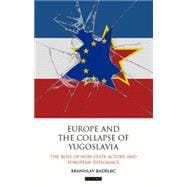
What is included with this book?
Branislav Radeljic is a Senior Lecturer in International Politics at the University of East London.
Acknowledgements * List of Abbreviations * Introduction * Writing the Collapse of Yugoslavia: Existing and Potential Arguments * Internal Factors * Economics: Factor of Connectivity * External Factors * What is yet to be Examined? * Conclusion * EUROPEAN COMMUNITY RELATIONS WITH YUGOSLAVIA * The European Community and Yugoslavia from Unofficial to Official Relations * Getting to Know Each Other * Communication * The 1960s: Closer or Looser Ties? * 1968: The Establishment of Official Relations * New Dynamics * Conclusion *The European Community and Yugoslavia from Integration to Disintegration * Introducing New Debates and Greater Concerns * The 1980s: New Agreement and New Challenges * 'A Slight Cooling in EEC-Yugoslavia Relations' * The End of the 1980s * Yugoslavs in the European Community * Conclusion * THE ROLE OF NON-STATE ACTORS * Calling Diaspora and Diaspora Calling: Impact of Diasporas on European Community Policy * Slovenian Activism * Croatian Activism * Diaspora Strategies within the European Community * Diasporas and Individual European States * Conclusion * Media Power: Media Influence on European Community Policy * Yugoslav Media and the Public * Awakening of the Western Media * European Community Reactions * Media Relevance for European Decision-Making * Conclusion * With the Blessing of the Vatican: The Catholic Church and European Community Policy * Between the Yugoslav Leadership and the Vatican * Religious Aspects of the Yugoslav Crisis * From Churches to the Brussels Officials * Conclusion * Conclusion * Notes * Bibliography *Index
The New copy of this book will include any supplemental materials advertised. Please check the title of the book to determine if it should include any access cards, study guides, lab manuals, CDs, etc.
The Used, Rental and eBook copies of this book are not guaranteed to include any supplemental materials. Typically, only the book itself is included. This is true even if the title states it includes any access cards, study guides, lab manuals, CDs, etc.